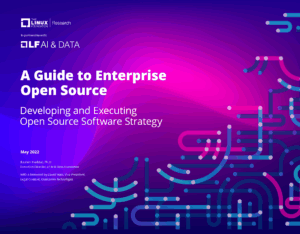by Ibrahim Haddad, Ph.D., General Manager, LF AI & Data Foundation

The LF AI & Data Foundation, the organization building an ecosystem to sustain open source innovation in artificial intelligence (AI) and data open source projects, is announcing the release of an editorial report by its General Manager, Ibrahim Haddad, Ph.D., titled, “A Guide to Enterprise Open Source.” This paper provides a guide for readers to develop and execute sound open source strategy for their organizations, from inception through implementation, and even identifying and navigating known challenges to this model.
The abstract is below, and you can find the entire report here: https://linuxfoundation.org/tools/guide-to-enterprise-open-source/
Abstract
Open source software (OSS) has transformed our world and become the backbone of our digital economy and the foundation of our digital world. From the internet and the mobile apps we use daily to the operating systems and programming languages we use to build the future, OSS has played a vital role. It is the lifeblood of the technology industry. Today, OSS powers the digital economy and enables scientific and technological breakthroughs that improve our lives. It’s in our phones, our cars, our airplanes, our homes, our businesses, and our governments. But just over two decades ago, few people had ever heard of OSS, and its use was limited to a small group of dedicated enthusiasts.
Organizations involved in building products or services involving software, regardless of their specific industry or sector, are likely to adopt OSS and contribute to open source projects deemed critical to their products and services. Organizations are creating open source program offices (OSPOs) to manage their open source activities from their adoption of OSS and compliance with applicable licenses to their participation in open standards and foundations.
Over many years, new industries and thousands of organizations have entered the open source ecosystem. In the early days, some organizations leapt into OSS without a proper strategy and an execution plan; they did not emerge as winners. Others took a deliberative approach that embraced OSS methodology and engineering practices; they came out as leaders for open source activities in their industries or verticals. To guide their ongoing use of OSS and their engagement with the open source ecosystem, they have developed open source strategies appropriate for their organizational constraints and industry challenges.
This guide offers a practical and systematic approach to establishing an open source strategy, developing an implementation plan, and accelerating an organization’s open source efforts.
Thank you to all who contribute to our mission at the LF AI & Data Foundation. Your involvement helps us to create and maintain vibrant and productive ecosystems in AI & data.
LF AI & Data Resources
- Learn about membership opportunities
- Explore the interactive landscape
- Check out our technical projects
- Join us at upcoming events
- Read the latest announcements on the blog
- Subscribe to the mailing lists
- Follow us on Twitter or LinkedIn
- Access other resources on LF AI & Data’s GitHub or Wiki